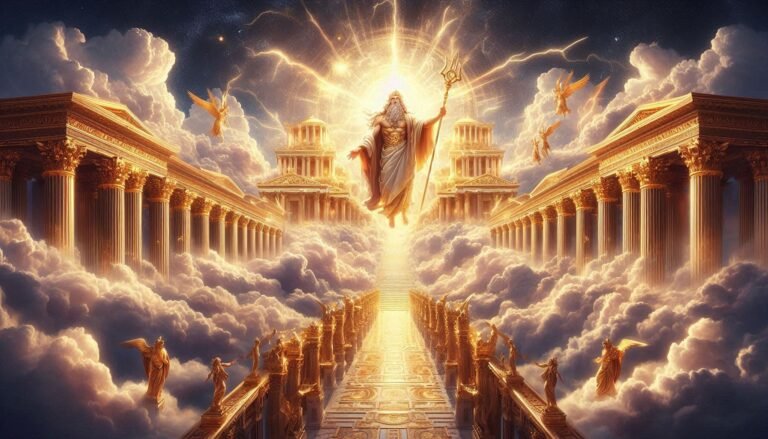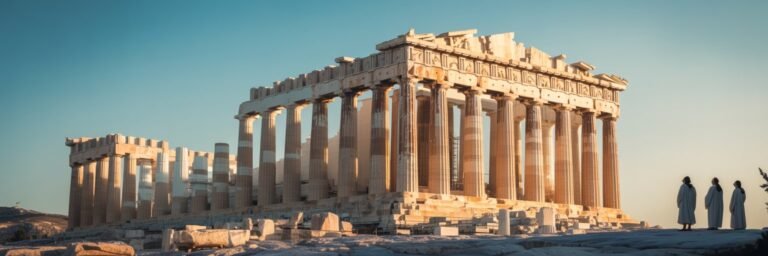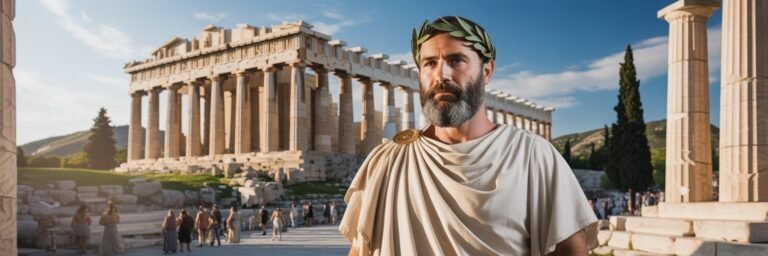Ancient Greece was a land of city-states, each with its own government, culture, and way of life. Among these, none were more influential—or more different—than Sparta and Athens. These two city-states embodied contrasting ideals, with Sparta representing a militaristic and disciplined society, while Athens stood as a beacon of democracy and intellectual achievement. Their rivalry, culminating in the Peloponnesian War (431–404 BCE), shaped the course of Greek history and left a lasting impact on Western civilization.
What made these two powers so different? How did their rivalry define the ancient world? Let’s explore the political, military, cultural, and societal contrasts that made Sparta and Athens both great and divided.
Political Systems: Oligarchy vs. Democracy
One of the most striking differences between Sparta and Athens was their system of government.
Sparta: The Warrior Oligarchy
Sparta was ruled by a unique form of government—a militaristic oligarchy. Power was concentrated in the hands of a small ruling elite, with strict laws ensuring order and control.
- Two Kings: Sparta had two hereditary kings who led the military and handled religious duties.
- The Gerousia: A council of 28 elders (over age 60) and the two kings, responsible for creating laws.
- The Ephors: A group of five magistrates who held immense power, overseeing daily governance and the military.
- The Apella: An assembly of Spartan male citizens, who could vote but had little real power.
Spartan government was highly conservative and rigid, designed to maintain the military-focused state.
Athens: The Birthplace of Democracy
In contrast, Athens was the cradle of democracy, where political power was (at least in theory) distributed among its citizens.
- The Ecclesia: An assembly where all free male citizens could vote on laws and policies.
- The Boule: A council of 500 citizens, chosen by lottery, which managed daily affairs.
- The Strategoi: A group of 10 elected generals who led the military.
Athens encouraged debate, political participation, and public discourse, making it the foundation of modern democratic systems.
Military Strength: The Spartan War Machine vs. The Athenian Navy
Sparta: The Ultimate Land Army
Sparta was a city of soldiers. Every aspect of its society revolved around military excellence.
- The Agoge: Spartan boys were taken from their families at age 7 and trained rigorously in combat, endurance, and discipline.
- The Hoplite Phalanx: Spartans fought in tightly packed formations, using shields, spears, and discipline to outmaneuver enemies.
- Helots: A subjugated class of enslaved people worked the land, freeing Spartans to focus entirely on warfare.
Sparta’s army was feared throughout Greece, known for their bravery, resilience, and refusal to surrender (as seen in the legendary Battle of Thermopylae, 480 BCE).
Athens: The Naval Superpower
While Sparta dominated on land, Athens ruled the seas.
- The Athenian Fleet: Athens built a powerful navy, centered around triremes, fast warships with three rows of oars.
- Naval Tactics: The Athenian navy mastered ramming maneuvers and naval blockades.
- The Delian League: Athens formed a naval alliance to protect Greek city-states from Persian aggression.
Athens’ naval superiority was crucial in battles like the Battle of Salamis (480 BCE), where they crushed the Persian fleet.
Society and Culture: Duty vs. Freedom
Spartan Society: A Life of Discipline
Sparta’s society was built on military service, duty, and order.
- Minimalist Lifestyle: Spartans rejected wealth and luxury, living simple, disciplined lives.
- Women’s Role: Spartan women were given more freedom than in other Greek cities—they could own property and were expected to maintain physical fitness to bear strong children.
- Isolationism: Sparta avoided foreign influence, limiting trade and travel.
Spartans lived for the state, where individual desires were sacrificed for military duty.
Athenian Society: A Hub of Art and Philosophy
Athens, by contrast, was a city of innovation, creativity, and intellectual exploration.
- Philosophy: Thinkers like Socrates, Plato, and Aristotle laid the foundations of Western thought.
- Theater: Athens developed drama, comedy, and tragedy, staging plays by Sophocles and Euripides.
- Education: Athenian boys were educated in philosophy, music, mathematics, and rhetoric.
Unlike Sparta, Athens encouraged free thought and artistic expression, making it the cultural heart of Greece.
The Peloponnesian War: The Clash of Titans (431–404 BCE)
As Athens grew in power, Sparta saw it as a threat. This led to the Peloponnesian War, a brutal conflict that shattered the Greek world.
Causes of the War
- Athenian Expansion: Athens, leading the Delian League, became increasingly dominant.
- Spartan Fear: Sparta feared Athenian influence and sought to contain its power.
- Allied Conflicts: Smaller Greek city-states, aligned with either Athens or Sparta, escalated tensions.
The War Unfolds
- Sparta’s Strategy: Invaded Athenian land, destroying crops and settlements.
- Athens’ Strategy: Used its navy to raid Spartan territories and maintain supply routes.
- The Plague of Athens (430 BCE): A devastating plague killed thousands, including leader Pericles.
- The Sicilian Expedition (415 BCE): Athens launched a disastrous invasion of Sicily, leading to massive losses.
- The Fall of Athens (404 BCE): Sparta, aided by Persia, finally blockaded and starved Athens into surrender.
Aftermath
Although Sparta won, the war weakened all of Greece, paving the way for later Macedonian and Roman conquests.
Legacy and Influence
Despite their rivalry, both Sparta and Athens left lasting legacies that shaped Western civilization.
Sparta’s Legacy
- Military Discipline: The Spartan model influenced later military strategies.
- Female Rights: Spartan women had greater freedoms compared to other Greek women.
- Valor and Honor: The Spartan ethos of courage and sacrifice remains legendary.
Athens’ Legacy
- Democracy: The Athenian political system inspired modern democratic governments.
- Philosophy: Athenian thinkers laid the foundations for science, ethics, and logic.
- Arts and Literature: Athenian drama and literature continue to influence storytelling today.
Two Powers, One Civilization
While Sparta and Athens were fierce rivals, both were essential to Greek history. Sparta’s warrior culture and Athens’ intellectual achievements created a balanced and powerful civilization. Their clash may have divided them, but their legacies remain intertwined, shaping the course of Western history.
Would you have chosen the discipline of Sparta or the freedom of Athens?





